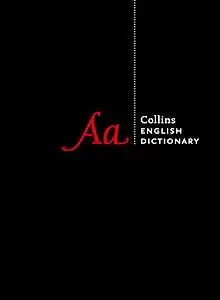Collins English Dictionary
The Collins English Dictionary is a printed and online dictionary of English. It is published by HarperCollins in Glasgow.[1]

The edition of the dictionary in 1979 with Patrick Hanks as editor and Laurence Urdang as editorial director, was the first British English dictionary to be typeset from the output from a computer database in a specified format. This meant that every aspect of an entry was handled by a different editor using different forms or templates. Once all the entries for an entry had been assembled, they were passed on to be keyed into the slowly assembled dictionary database which was completed for the typesetting of the first edition.
In a later edition, they increasingly used the Bank of English established by John Sinclair at COBUILD to provide typical citations rather than examples composed by the lexicographer.
Editions
The current edition is the 13th edition, which was published in November 2018.[2] The previous edition was the 12th edition, which was published in October 2014. A special "30th Anniversary" 10th edition was published in 2010, with earlier editions published once every 3–4 years.
CollinsDictionary.com
The unabridged Collins English Dictionary was published on the web on 31 December 2011 on CollinsDictionary.com, along with the unabridged dictionaries of French, German, Spanish and Italian.[3] The site also includes example sentences showing word usage from the Collins Bank of English Corpus, word frequencies and trends from the Google Ngrams project, and word images from Flickr.
In August 2012, CollinsDictionary.com introduced crowd-sourcing for neologisms,[4][5][6] whilst still maintaining overall editorial control to remain distinct from Wiktionary and Urban Dictionary. This followed an earlier launch of a discussion forum for neologisms in 2004.[7]
In May 2015, CollinsDictionary.com added 6,500 new Scrabble words to their Collins Official Scrabble Wordlist. The words are based on terms related to and influenced by slang, social media, food, technology, and more.[8]
References
- "History". www.harpercollins.co.uk. Glasgow: HarperCollins. 2015. Archived from the original on 11 June 2019. Retrieved 11 June 2019.
- "Collins English Dictionary [13th edition]". collins.co.uk. HarperCollins. Retrieved 16 November 2018.
- Collins launches free dictionary siteWired UK, 3 January 2012. Archived 4 March 2016 at the Wayback Machine
- Price, Emily (17 July 2012). "YOLO in the Dictionary? Collins Crowdsources Lexicon". Mashable. New York City: Ziff Davis. Archived from the original on 11 June 2019. Retrieved 11 June 2019.
- Reid, Susanna Victoria; Turnbull, William Robert Joylon; Brown, Alex; et al. (11 September 2012). "Blootered? New words in dictionary" (Video). BBC News Online. MediaCityUK, Salford Quays: British Broadcasting Corporation. Archived from the original on 11 June 2019. Retrieved 11 June 2019.
- "Collins online dictionary adds mummy porn and blootered". BBC News Online. Glasgow: British Broadcasting Corporation. 11 September 2012. Archived from the original on 11 June 2019. Retrieved 11 June 2019.
- Moss, Stephen (16 December 2004). "Collins launches online dictionary to debate new words". The Guardian. London: Guardian Media Group. Archived from the original on 11 June 2019. Retrieved 11 June 2019.
- "Discover the New Scrabble Words". www.collinsdictionary.com. HarperCollins. 21 May 2015. Archived from the original on 11 June 2019. Retrieved 11 June 2019.
External links
- CollinsDictionary.com – Collins English Dictionary, American English Dictionary, Thesaurus, French, German, Italian and Spanish.
